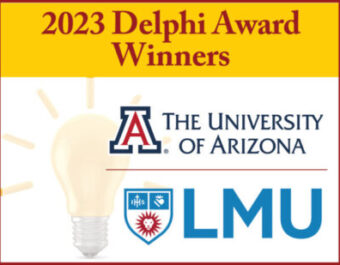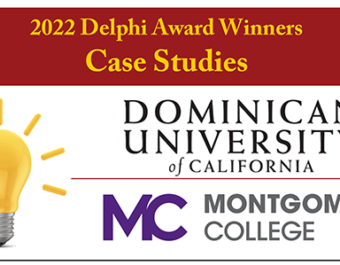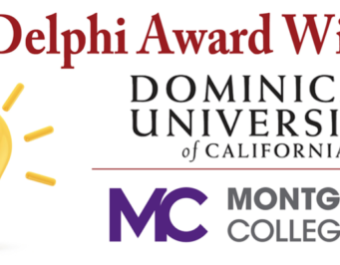Delphi Home | History | Tools & Resources | Books & Articles | News & Events | Delphi Award | FAQ | FACE on Faculty Project
The Delphi Project is dedicated to enhancing awareness about the changing faculty trends using research and data to better support faculty off the tenure track and to help create new faculty models to support higher education institutions in the future.
An initiative of the Pullias Center for Higher Education at the University of Southern California, the Delphi Project works in partnership with the Association of American College and Universities (AAC&U). The project has received generous funding from The Spencer Foundation, The Teagle Foundation, The Carnegie Corporation of New York, and the TIAA Institute.
The Delphi Project also includes The Delphi Award. Click here to learn more about the Award. This $15,000 cash award is presented to two applicants each year who have been selected for their innovative work to support non-tenure-track, contingent and/or adjunct faculty in pursuing strategic priorities such as student learning and community engagement. The winners for the 2022 Delphi Award are Dominican University of California and Montgomery College in Maryland. Learn more about our winners and two finalists, here.
Additionally, The Delphi Project supports the right of non-tenure-track faculty to collectively bargain.
Supporting Change
The Delphi Project has set up a page with all of the center’s tools and resources to help you support adjunct, contingent, part-time, and non-tenure track faculty change on your campus. Additionally, The Delphi Project has also mapped out five steps to take towards that goal (click on each for supporting resources)…
- Assess the Need for Change – Download free self-assessment tools to determine the culture of your campus or department for non-tenure-track faculty.
- Make the Case – Find compelling research about how non-tenure-track faculty working conditions affect teaching performance and student learning.
- Implement the Change – Step-by-step guides to creating new faculty models that support student success — both at the departmental and campus levels.
- Read the Case Studies – Learn from the many institutions that have gone through the self-assessment and change implementation processes.
- Find the Resources – Learn how to locate the resources that fit within your institution’s budget.
Latest Updates
The Delphi Team
Adrianna Kezar
Director
Elizabeth Holcombe
Senior Postdoctoral Research Associate
KC Culver
Senior Postdoctoral Research Associate
Jordan Harper
Researcher
Daniel Scott
Researcher
Partner
![]()
American Association of Colleges and Universities AAC&U is the leading national association dedicated to advancing the vitality and public standing of liberal education by making quality and equity the foundations for excellence in undergraduate education in service to democracy. Its members are committed to extending the advantages of a liberal education to all students, regardless of academic specialization or intended career. Founded in 1915, AAC&U now comprises 1,400 member institutions—including accredited public and private colleges, community colleges, research universities, and comprehensive universities of every type and size.
AAC&U functions as a catalyst and facilitator, forging links among presidents, administrators, faculty, and staff engaged in institutional and curricular planning. Through a broad range of activities, AAC&U reinforces the collective commitment to liberal education at the national, local, and global levels. Its high-quality programs, publications, research, meetings, institutes, public outreach efforts, and campus-based projects help individual institutions ensure that the quality of student learning is central to their work as they evolve to meet new economic and social challenges.
Information about AAC&U can be found at www.aacu.org.
Funders
 The Spencer Foundation is committed to investigating ways in which education, broadly conceived, can be improved around the world. From the first, the Foundation has been dedicated to the belief that research is necessary to the improvement in education. The Foundation is thus committed to supporting high-quality investigation of education through its research programs and to strengthening and renewing the educational research community through its fellowship and training programs and related activities.
The Spencer Foundation is committed to investigating ways in which education, broadly conceived, can be improved around the world. From the first, the Foundation has been dedicated to the belief that research is necessary to the improvement in education. The Foundation is thus committed to supporting high-quality investigation of education through its research programs and to strengthening and renewing the educational research community through its fellowship and training programs and related activities.
 The Teagle Foundation works to support and strengthen liberal arts education. The foundation’s aim is to serve as a catalyst for the improvement of teaching and learning in the arts and sciences while addressing issues of financial sustainability and accountability in higher education. The Teagle Foundation supports innovation in curriculum, pedagogy, and assessment with an eye towards combining improvements in quality with considerations of cost.
The Teagle Foundation works to support and strengthen liberal arts education. The foundation’s aim is to serve as a catalyst for the improvement of teaching and learning in the arts and sciences while addressing issues of financial sustainability and accountability in higher education. The Teagle Foundation supports innovation in curriculum, pedagogy, and assessment with an eye towards combining improvements in quality with considerations of cost.
The Carnegie Corporation of New York, founded by Andrew Carnegie, was envisioned as a foundation that would “promote the advancement and diffusion of knowledge and understanding.” In keeping with this mandate, the Carnegie Corporation of New York’s work incorporates an affirmation of our historic role as an education foundation but also honors Andrew Carnegie’s passion for international peace and the health of our democracy.
![]() The TIAA Institute helps advance the ways individuals and institutions plan for financial security and organizational effectiveness. The Institute conducts in-depth research, provides access to a network of thought leaders, and enables those it serves to anticipate trends, plan future strategies and maximize opportunities for success. To learn more about our work and engage with our community of thought leaders, please visit our website at www.tiaainstitute.org and follow us on Twitter at @TIAAInstitute.
The TIAA Institute helps advance the ways individuals and institutions plan for financial security and organizational effectiveness. The Institute conducts in-depth research, provides access to a network of thought leaders, and enables those it serves to anticipate trends, plan future strategies and maximize opportunities for success. To learn more about our work and engage with our community of thought leaders, please visit our website at www.tiaainstitute.org and follow us on Twitter at @TIAAInstitute.
 National Science Foundation‘s mission is to advance the progress of science, a mission accomplished by funding proposals for research and education made by scientists, engineers, and educators from across the country. This project is funded from the Improving Undergraduate STEM Education program within the Department of Undergraduate Education of the National Science Foundation, under Grant No. NSF DUE-1914784
National Science Foundation‘s mission is to advance the progress of science, a mission accomplished by funding proposals for research and education made by scientists, engineers, and educators from across the country. This project is funded from the Improving Undergraduate STEM Education program within the Department of Undergraduate Education of the National Science Foundation, under Grant No. NSF DUE-1914784
 National Science Foundation‘s mission is to advance the progress of science, a mission accomplished by funding proposals for research and education made by scientists, engineers, and educators from across the country. The “Understanding Faculty, Academic Careers, and Environments in Service of Equity (FACE)” project is funded from the NSF’s EHR Core Research program within the Division of Human Resource Development of the National Science Foundation, under Grant No. NSF 2200769.
National Science Foundation‘s mission is to advance the progress of science, a mission accomplished by funding proposals for research and education made by scientists, engineers, and educators from across the country. The “Understanding Faculty, Academic Careers, and Environments in Service of Equity (FACE)” project is funded from the NSF’s EHR Core Research program within the Division of Human Resource Development of the National Science Foundation, under Grant No. NSF 2200769.




